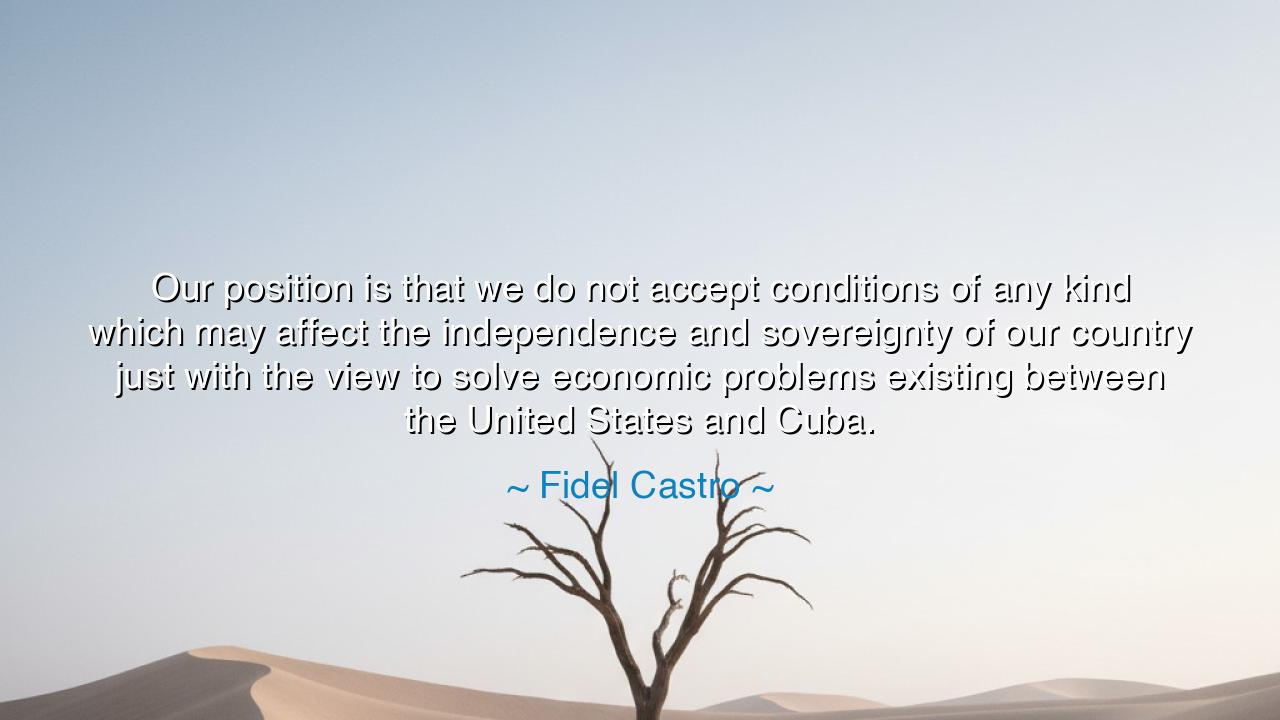
Our position is that we do not accept conditions of any kind
Our position is that we do not accept conditions of any kind which may affect the independence and sovereignty of our country just with the view to solve economic problems existing between the United States and Cuba.






The words of Fidel Castro, spoken amid the tempest of history, carry the defiant fire of a small nation standing before an empire. When he declared, “Our position is that we do not accept conditions of any kind which may affect the independence and sovereignty of our country just with the view to solve economic problems existing between the United States and Cuba,” he spoke not merely as a statesman, but as the voice of a people who had known hunger, tyranny, and pride. His statement was not only political—it was spiritual. It was the cry of a nation determined to guard its dignity, even when surrounded by powers greater in wealth, might, and influence.
To understand the roots of this declaration, one must return to the years following the Cuban Revolution of 1959, when a new dawn rose over the island. The old order—the rule of Batista, the corruption, the foreign domination—was swept away in the fervor of liberation. The revolution promised self-determination, a new life free from the dictates of others. Yet, freedom is a costly jewel, and the world’s powerful nations often demand tribute for peace. The United States, fearful of the spread of communism and angered by Cuba’s nationalization of American industries, sought to bring the island to its knees through embargoes and isolation. It offered aid, but at a price—submission. It offered negotiation, but under conditions that would make Cuba again a vassal instead of a sovereign.
Castro’s response was resolute. He would not trade the soul of a nation for barrels of oil or bags of grain. He would not allow the economic hardship of the moment to become the chain of tomorrow. His words, fierce and unyielding, remind us that true independence cannot be bought or bargained—it must be lived, even in suffering. To accept conditions that compromise sovereignty is to sell one’s birthright for bread. The revolution, to him, was not a transaction but a covenant—a promise between the people and their dignity.
There is a tale that embodies this spirit. In 1961, during the Bay of Pigs invasion, Cuba was invaded by exiles backed by the United States, intent on toppling the new government. The odds were impossible. Yet the Cuban people, armed with little more than courage and conviction, stood their ground. In just three days, they repelled the invaders. For Castro, it was not merely a military victory—it was the living proof of his creed: that independence defended, no matter how small the defender, is stronger than wealth gained through submission. The message was clear to the world: Cuba would stand alone before it would bow.
In the voice of the ancients, we might say: it is better to walk barefoot upon one’s own soil than to ride gilded chariots under the rule of another. Empires have always tempted the smaller nations with gold, with trade, with promises of prosperity. But gold tarnishes; pride endures. The sovereignty of a people is like the flame of an altar—once given away, it may never burn as brightly again. Thus, Castro’s words, though born in a time of ideological war, speak to a universal truth: that freedom without self-respect is a hollow victory.
But let not this teaching be mistaken for arrogance or isolation. The lesson is not that one must reject all cooperation, but that one must discern the difference between partnership and submission. To work with others is noble; to yield one’s principles for comfort is ruinous. Castro’s defiance, whether one admires or condemns him, reveals an enduring law of the world: those who value sovereignty above ease preserve the soul of their nation. Those who sell it for convenience lose not only their independence, but their very identity.
And so, what wisdom may future generations take from this? It is this: guard your integrity as fiercely as your life. Whether as a person or as a nation, do not surrender your values for comfort, nor your voice for approval. If you must struggle, let it be a struggle in dignity; if you must suffer, let it be in freedom. Wealth may feed the body, but independence nourishes the spirit.
The practical path is thus: when confronted with power that demands your obedience, remember who you are and what you stand for. Seek solutions, but not at the price of your truth. For as the old wisdom teaches, better a poor man who walks in honor than a rich man who bows in shame. Let every person, every nation, remember this: that freedom, once surrendered, is not easily reclaimed. Stand firm, then, as Castro once did, not in hatred, but in the unshakable love of one’s homeland and one’s own soul.






AAdministratorAdministrator
Welcome, honored guests. Please leave a comment, we will respond soon